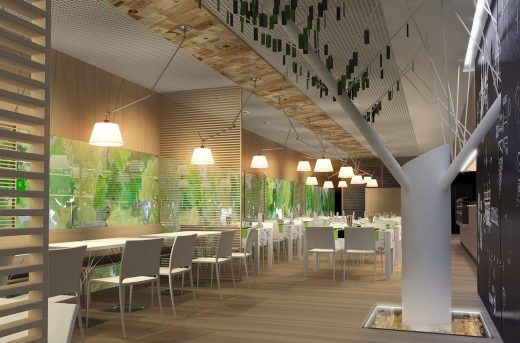AI impact in creating stunning spaces, Artificial intelligence interior design, Modern architecture systems
Impact of AI in Creating Stunning Spaces
5 April 2024
Revolutionizing Interior Design – The Impact of AI in Creating Stunning Spaces
In today’s digital age, artificial intelligence (AI) is transforming industries across the board, and interior design is no exception. Gone are the days of relying solely on human intuition and expertise to craft visually appealing and functional spaces. AI technology is revolutionizing the interior design process, offering innovative tools and solutions that enhance creativity, efficiency, and personalization.
Understanding the Role of AI in Interior Design
Traditionally, interior design has been a labor-intensive process, requiring extensive manual work from designers to conceptualize, plan, and execute projects. However, with the advent of AI, designers now have access to powerful tools and algorithms that streamline various aspects of the design process, such as enhancing image quality, by utilizing AI-powered image enhancer tools. From generating design concepts to optimizing space utilization, AI for interior design to work more efficiently and effectively than ever before.
Enhancing Creativity and Efficiency with AI Tools
One of the most significant benefits of AI in interior design is its ability to enhance creativity and efficiency. AI-powered software can analyze vast amounts of data and generate design recommendations based on user preferences, style trends, and spatial constraints. This enables designers to explore a wider range of design possibilities and experiment with different layouts, colors, and materials in a fraction of the time it would take using traditional methods.
Personalized Designs: Tailoring Spaces to Individual Preferences
One of the key advantages of AI in interior design is its capacity to create personalized spaces that cater to the unique preferences and needs of each client. By leveraging machine learning algorithms, designers can analyze user data, such as past design preferences, lifestyle habits, and aesthetic preferences, to tailor designs that resonate with their clients on a personal level. Whether it’s integrating smart home technology or incorporating sustainable materials, AI enables designers to create spaces that are both functional and reflective of the client’s personality and lifestyle.
Optimizing Space Utilization and Functionality through AI Algorithms
AI algorithms play a crucial role in optimizing space utilization and functionality in interior design. By analyzing spatial data and user requirements, AI can suggest layout configurations that maximize the use of available space while enhancing functionality and flow. Whether it’s rearranging furniture to improve traffic flow or optimizing lighting and ventilation for energy efficiency, AI algorithms can help designers make informed decisions that result in more practical and comfortable living environments.
The Future of Interior Design: Innovations and Trends Powered by AI
As AI continues to evolve and become more sophisticated, the future of interior design looks increasingly promising. From virtual reality (VR) and augmented reality (AR) simulations to AI-driven robotic fabrication techniques, the possibilities for innovation are endless. By embracing AI technology, designers can push the boundaries of creativity and unlock new possibilities for designing spaces that are not only aesthetically pleasing but also intelligent, adaptive, and sustainable.
Overcoming Challenges and Embracing Opportunities in AI Integration
While the integration of AI in interior design offers numerous benefits, it also presents challenges that must be addressed. Designers must grapple with issues such as data privacy, ethical considerations, and the potential for AI to replace human creativity and intuition. However, by adopting responsible AI practices and embracing AI as a tool to augment rather than replace human expertise, designers can harness its full potential to create truly exceptional spaces that enhance the quality of life for their clients.
Case Studies: Successful Applications of AI in Real-world Interior Design Projects
Numerous real-world examples demonstrate the successful application of AI in interior design. From AI-powered design platforms that generate personalized recommendations to virtual reality tools that enable clients to visualize spaces before they’re built, these case studies highlight the transformative impact of AI on the industry. Whether it’s helping designers work more efficiently, improving the client experience, or pushing the boundaries of design innovation, AI is reshaping the way we approach interior design in the digital age.
Ethical Considerations and Responsible AI Practices in Interior Design
As AI technology continues to advance, it’s essential for designers to consider the ethical implications of its use in interior design. Issues such as bias in AI algorithms, data privacy concerns, and the potential for job displacement must be carefully addressed to ensure that AI benefits society as a whole. By prioritizing responsible AI practices and fostering collaboration between humans and machines, designers can harness the transformative power of AI to create spaces that not only inspire but also enrich the lives of those who inhabit them.
Impact of AI in Creating Stunning Interior Design Conclusion
In conclusion, AI is revolutionizing interior design by offering innovative tools and solutions that enhance creativity, efficiency, and personalization. From generating design concepts to optimizing space utilization and functionality, AI empowers designers to push the boundaries of innovation and create spaces that are truly exceptional.
However, it’s essential to approach the integration of AI in interior design with careful consideration of ethical considerations and responsible AI practices to ensure that its benefits are realized without compromising human creativity, intuition, and wellbeing. As we continue to embrace AI technology, the future of interior design looks brighter than ever, with endless possibilities for innovation and creativity.
FAQs About AI for Interior Design
What is AI’s role in interior design?
- AI plays a significant role in interior design by offering tools and algorithms that streamline various aspects of the design process. It enhances creativity, efficiency, and personalization by analyzing data, generating design recommendations, and optimizing space utilization.
How does AI enhance creativity and efficiency in interior design?
- AI-powered software can analyze vast amounts of data and generate design recommendations based on user preferences, style trends, and spatial constraints. This enables designers to explore a wider range of design possibilities and experiment with different layouts, colors, and materials in less time than traditional methods.
Can AI create personalized designs in interior design?
- Yes, AI can create personalized designs by analyzing user data such as past design preferences, lifestyle habits, and aesthetic preferences. By leveraging machine learning algorithms, designers can tailor designs that resonate with clients on a personal level, integrating smart home technology, sustainable materials, and other elements according to individual needs.
How does AI optimize space utilization and functionality?
- AI algorithms analyze spatial data and user requirements to suggest layout configurations that maximize the use of available space while enhancing functionality and flow. Whether it’s rearranging furniture for improved traffic flow or optimizing lighting and ventilation for energy efficiency, AI helps designers make informed decisions that result in practical and comfortable living environments.
What are some examples of AI applications in real-world interior design projects?
- Real-world examples include AI-powered design platforms that generate personalized recommendations, virtual reality tools that enable clients to visualize spaces before they’re built, and robotic fabrication techniques driven by AI algorithms. These applications highlight AI’s transformative impact on the industry, improving efficiency, client experience, and design innovation.
What ethical considerations should be addressed when integrating AI in interior design?
- Designers must consider issues such as bias in AI algorithms, data privacy concerns, and the potential for job displacement. Prioritizing responsible AI practices and fostering collaboration between humans and machines is crucial to ensure AI benefits society without compromising human creativity, intuition, and wellbeing.
What is the future of interior design with AI technology?
- As AI continues to evolve, the future of interior design looks promising, with possibilities for innovation such as virtual reality simulations, augmented reality tools, and intelligent, adaptive spaces. By embracing AI technology responsibly, designers can push the boundaries of creativity and create spaces that inspire and enrich the lives of those who inhabit them.
Comments on this guide to AI impact in creating stunning spaces article are welcome.
Architectural Design
AI Design
Integrating humans with AI in structural design
AI-based industrial decarbonization technology
Architectural Designs
NHOW Hotel in Frankfurt, Germany
Arctic TreeHouse Hotel in Rovaniemi, Finland
Property
Contemporary Property Articles – architectural selection below:
Comments / photos for the AI impact in creating stunning spaces page welcome







